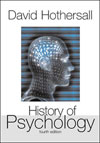 |  History of Psychology, 4/e David Hothersall,
Ohio State University
Philosophical and Scientific Antecedents of Psychology
Chapter Outline
 |  |  | The Renaissance World- Art
- Gutenberg
- Geography
|
 |  |  | Renaissance Science- Astronomy
- Copernicus
- Ptolemy
- Bruno
- Galileo
- Telescope
- Heliocentrism
- Conflict with Church
- Experimentalism
- Two Contributions from England
- Newton
- Light
- Gravity
- Harvey
- The Movement of Blood
|
 |  |  | Renaissance Philosophy- Descartes
- Analytical Geometry
- Systematic doubt
- Cogito ergo sum
- Mechanism
- Interactive Dualism
- Innate and Derived Ideas
- La Mettrie
- Mechanism
- Language
|
 |  |  | Post-Renaissance Philosophy: Empiricism, Associationism, and Nativism- Early Empiricists
- Hobbes
- Leviathan
- Locke
- Two Treatises on Government
- Philosophy of Education
- Essay Concerning Human Understanding
- Sensations and Reflections
- Berkeley
- Immaterialism
- Seventeenth-Century Nativist Countervoice
- Von Leibniz
- Monadology
- Eighteenth-Century Associationism
- Hume
- Impressions and Ideas
- Hartley
- Nineteenth-Century Associationism
- James Mill
- John Stuart Mill
- Bain
- Mind
- Eighteenth-Century Nativist Countervoice
- Kant
|
|



 2004 McGraw-Hill Higher Education
2004 McGraw-Hill Higher Education